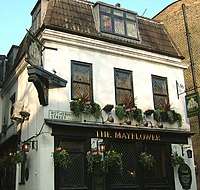Rotherhithe Street
Rotherhithe Street is a road in the London Borough of Southwark on the Thames Path. At a length of around 1.5 miles (2.4 km), it is the longest street in London. Notable buildings on the street include the Grade II* listed Nelson House, St Mary's Church, Rotherhithe and Surrey Docks Farm.
 Mayflower pub on Rotherhithe Street | |
| Owner | London Borough of Southwark |
|---|---|
| Length | 1.5 mi (2.4 km) |
| Postal code | SE16 |
| Nearest metro station | Rotherhithe railway station |
| Other | |
| Known for | Longest road in London |
About
.jpg)
Owing to the bending of the River Thames in the area,[1] Rotherhithe Street is around 1.5 miles (2.4 km) long, making it the longest street in London.[2][3][4] The road runs parallel to the River Thames,[5] and comprises part of the Thames Path.[2]
The street contains the 18th century Grade II* listed Nelson House, a Georgian house situated next to Nelson Dock.[2][3] Nelson Dock is a dry dock, active from the 17th century until 1968,[3] and now has the ship La Dame de Serk permanently moored.[6] The Mayflower pub, a pub named after the Pilgrim Fathers' ship,[1] and which claims to be the oldest London riverside pub, is situated on Rotherhithe Street,[7] as is the city farm Surrey Docks Farm.[6] Other significant buildings on the street include the Trinity Halls and Church, which were built in 1836,[6] the former Rotherhithe fire station, which was active from 1906 until 1965 and has been converted to riverside flats,[6] and the free entry Rotherhithe Heritage Museum.[2][3] At one end of the street is St Mary's Church, Rotherhithe, where Prince Lee Boo is buried.[3] There is also a Hilton hotel on Rotherhithe Street,[3][6] and around 2 acres (8,100 m2) of former dockland near to the street has been converted into a nature park.[1]
In 1868, a number of timber buildings on Rotherhithe Street including the White Lion pub were badly damaged by a fire.[8] In 1893, two pubs on the street, The Three Compasses and Noah's Ark, were both put up for sale,[9] and in 1900, a mill at 9-13 Rotherhithe Street was also put up for sale.[10]
Transport
Towards one end of Rotherhithe Street is the Rotherhithe Tunnel, which goes under the Thames and links Rotherhithe with Wapping.[3] Thames Clippers operate a ferry between Rotherhithe Street and Canary Wharf.[11] In 2020, plans were announced for a new Transport for London owned electric ferry service between Rotherhithe and Canary Wharf, replacing previous plans for a bridge between the two areas.[11][12] The street is planned to become part of the Rotherhithe Cycleway.[12]
References
- Hibbert, Christopher (September 2011). The London Encyclopaedia (3rd Edition). Macmillan Publishers. p. 703.
- Rob, Humphreys; Bamber, Judith (2003). The Rough Guide to London. Rough Guides. p. 18. Retrieved 9 March 2020.
- Coast: The Walks. Random House. 2008. pp. 9–10. Retrieved 9 March 2020.
- "London's tiniest attractions: 13 places you wouldn't spot if you weren't looking". The Daily Telegraph. 27 October 2019. Retrieved 9 March 2020.
- Lockie, John (1810). Lockie's Topography of London, giving a concise local description of ... every square, street, lane, ... dock, ... wharf, ... public office, in the metropolis and its environs. ... The whole alphabetically arranged, etc.
- "Nelson House & Dock". BBC News. 12 June 2009. Retrieved 9 March 2020.
- McKinnell, Ellie (28 February 2020). "How these classic old London pubs got their bizarre names". My London. Retrieved 9 March 2020.
- "Rotherhithe". The Observer. 7 June 1868. p. 3. Retrieved 11 March 2020 – via Newspapers.com.
- "Rotherhithe". The Standard. 12 July 1893. p. 10. Retrieved 11 March 2020 – via Newspapers.com.
- "Rotherhithe". The Glasgow Herald. 27 October 1900. p. 8. Retrieved 11 March 2020 – via Newspapers.com.
- "Rotherhithe to Canary Wharf Crossing - New Electric Ferry Service Option" (PDF) (pdf). London Assembly. 16 May 2019. Retrieved 9 March 2020.
- Reynolds, Laura (6 March 2020). "TfL Announces Plans For New Ferry Between Rotherhithe And Canary Wharf". Londonist. Retrieved 9 March 2020.